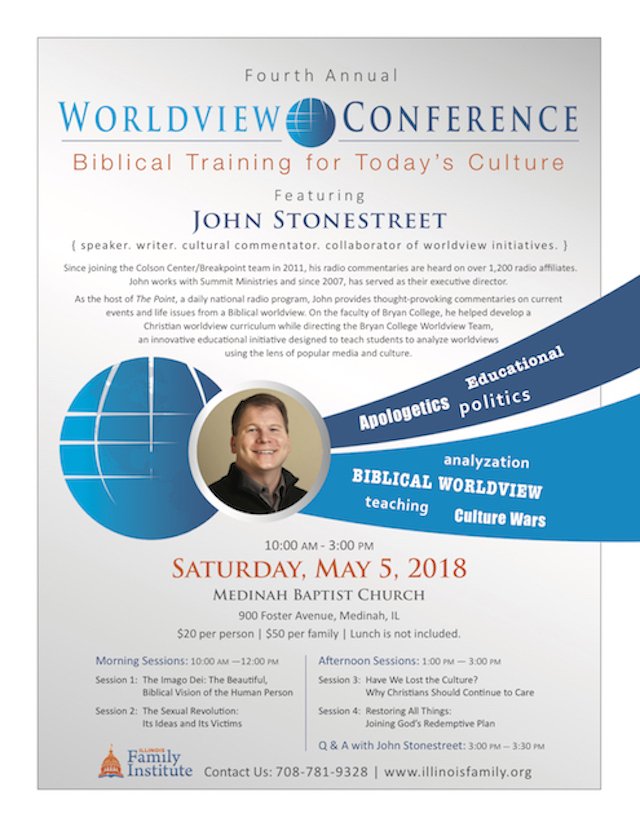Don’t Miss Breakpoint’s John Stonestreet Teaching Worldview – May 5th!
Every day the established media and pop culture assault traditional Christian beliefs and values with messages in direct opposition to the precepts conservative Christians hold dear.
But even less overtly hostile people and organizations in our modern world seek to mold minds with messages which contradict biblical principles.
How can you, your children and grandchildren identify and challenge the false ideologies and agendas dominating the day? How do we respond to politically correct claims with gracious, unequivocal and sound argument? Are we prepared to filter out wrong thinking and courageously and respectfully engage the culture with the truth?
John Stonestreet, president of the Colson Center for Worldview, offers this description of culture:
[C]ulture is the sum of everything we as human beings create, write, say, do, and think—the marks we leave on our world. In that sense, “engaging the culture” isn’t really optional. It’s human. It’s as much a part of being alive as breathing is. We don’t decide whether we’ll engage the culture. Just how.
Illinois Family Institute’s mission is “to bring a biblical perspective to public policy.” If we truly believe that every square inch of human existence belongs to Christ, the public square is included. As Christ followers, we are called not just to care about our fellow churchgoer but also to love our neighbors as ourselves (Matthew 22:26-40). We are to care about the lies and injustices being promoted in our local neighborhoods as well as the lies and injustices being promoted in the state and national legislatures, government schools, the media, in the arts, the corporate world, sports and throughout Illinois.
Romans 8 tells us that all of “creation groans and suffers” because of the fall. Yet Christians are called to spread the gospel truth to all the nations, “teaching them to observe all things” commanded by God (Matthew 28:19-20). How do we do this in a culture that is hellbent on revolution and rebellion? After all, not only are we calling evil good and good evil, but we are also now calling boys girls and girls boys.
The Apostle Peter admonished us:
But in your hearts revere Christ as Lord. Always be prepared to give an answer to everyone who asks you to give the reason for the hope that you have. But do this with gentleness and respect. (1 Peter 3:15)
To that end, we want to encourage you to join us for our Fourth Annual Worldview Conference featuring the aforementioned John Stonestreet. And please, bring your older children and grandchildren.
Mr. Stonestreet has a passion “to illuminate a biblical worldview for today’s culture.” He’s an amazing speaker, writer, cultural commentator, and collaborator of worldview initiatives. This event is a rare opportunity to hone your skills of both defending the faith and fending off false teaching.
This event is a rare opportunity to hone your skills of both defending the faith and fending off false teaching.
Consider Francis Schaeffer, one the the twentieth century’s great apologists. Todd Kappelman writes this about Francis Schaeffer, one of the 20th Century’s great apologists:
Schaeffer’s greatest gift, like that of C.S. Lewis, was his concern for the average Christian. He believed philosophy, theology, and ethics should not be reserved for the conversation of learned academics; rather they should be the daily concern of the man on the street. The price for ignorance of the subjects could be our life, or more importantly, our very souls. The Scriptures are very clear concerning the price of ignorance. The prophet Hosea said that God’s people perish for lack of knowledge.
. . .
Schaeffer believed that man has a natural inclination to desire the reasonable. Schaeffer argued that the Christian faith is not only true, but that it is the most plausible account for the existence of man and his place in the universe. He contended that an irrational faith is not what God intended to communicate to man. (emphasis added)
IFI is excited to offer this opportunity for you to become better prepared to follow the admonition of the prophet Hosea by augmenting your knowledge in the service of being prepared to give an answer to everyone who asks.
Please sign up now to join us for one day that we believe and pray will dramatically change your approach to education, news, entertainment and interactions with family members, friends, neighbors, colleagues, teachers, and lawmakers.
One short day could prepare you to be salt and light, to touch hearts and minds with the truth in a world that desperately needs the truth, the life and the way.
Saturday, May 5, 2018
Medinah Baptist Church
900 Foster Ave, Medinah, IL 60157 (map)
Click here for flyer
Group pricing available!
Call the IFI office for details: (708) 781-9328
